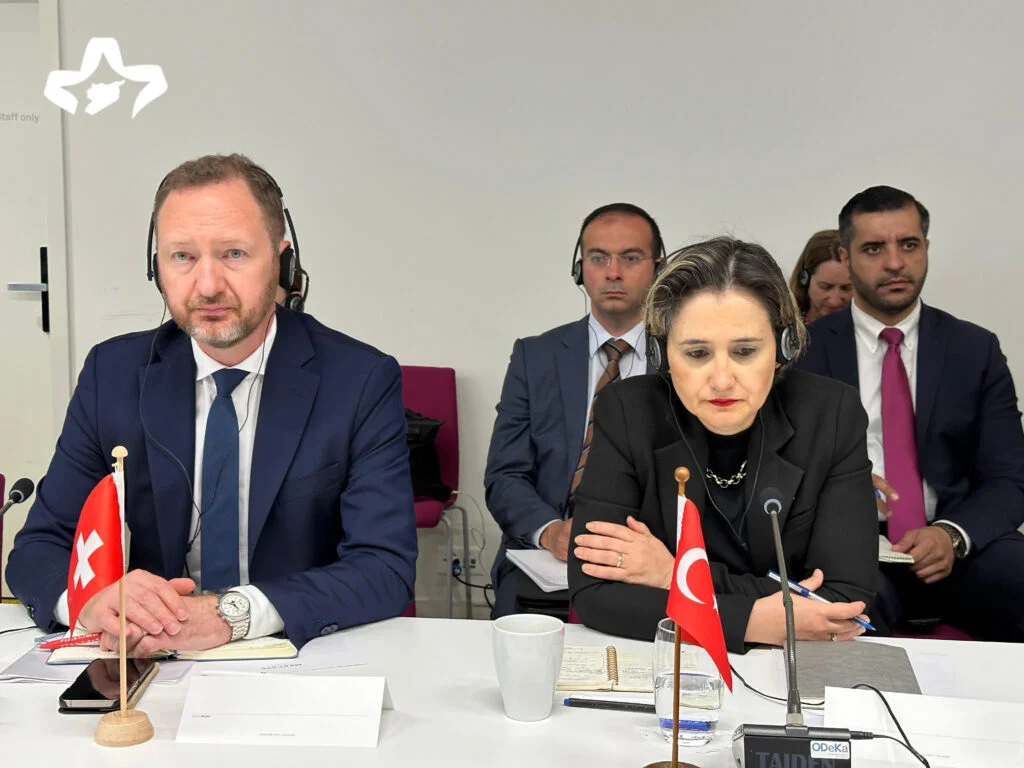What Did Foreign Envoys and Representatives Convey to Syrian Negotiations Commission in Geneva?

June 11, 2024
At the invitation of the Syrian Negotiations Commission, a broad meeting was held in Geneva on Tuesday, which included the leadership, members, and representatives of the Commission’s components, international envoys and representatives to Syria, and Arab and European diplomats. Representatives of Syrian civil society organizations also participated.
American Position
Ethan Goldrich, the US Deputy Assistant Secretary of State for Near Eastern Affairs, responsible for the Levant and Syria engagement, praised the immense efforts of the Syrian Negotiations Commission. He stressed the United States’ commitment to working jointly with the Syrian opposition and continuing all possible efforts to advance the political process in accordance with UN resolutions. He added that the United States continues to impose sanctions on the Syrian regime, supports the Syrian opposition, and completely rejects normalization with the Syrian regime.
Turkish Position
Ms. Nazmiye Başaran, advisor in the political department at the Turkish Foreign Ministry, outlined a comprehensive Turkish approach based on four integrated elements to address the Syrian issue. The first is combating terrorism in all its forms, the second is advancing the political process in line with UN Resolution 2254, the third is creating conditions for a dignified and safe return of Syrian refugees, and the fourth is providing aid to Syrians in need. These paths must proceed in tandem, strictly adhering to UN resolutions to prevent the situation from worsening.
European Position
Mr. Alessio Cappellani, Head of the Middle East Division for Egypt, Jordan, Syria, and Lebanon at the European External Action Service, praised the engagement of Syrian political forces with civil society. He emphasized the importance of listening to both sides regarding their roles in Syria’s future, reaffirming Europe’s commitment to UN resolutions. He stressed that UN Resolution 2254 is the sole solution to the Syrian crisis and highlighted the need to fulfill pledges to assist Syrians, noting that current conditions are not safe for return. He called on the Syrian regime to create safe conditions for refugees’ return and ensure no violations occur in host countries. Europe maintains red lines regarding early recovery efforts.
German Position
Mr. Stefan Schneck, the German Special Envoy to Syria, noted that Germany continues to provide aid and support to the Syrian people across multiple sectors, including education, humanitarian aid, and combating the regime’s drug trade. He indicated that Germany will be cautious in controlling aid if it supports the Early Recovery Fund. Schneck emphasized coordination with the Syrian Negotiations Commission on various issues and reiterated Germany’s commitment to cooperating on initiatives and projects that advance the political solution.
Netherlands Position
Mr. Gijs Gerlag, the Netherlands Special Envoy to Syria, reiterated that UN Resolution 2254 is the only solution to the Syrian crisis. He stated that the Netherlands has and will continue to support the opposition until a political solution is achieved. He affirmed that his country will not forcibly return Syrian refugees under current circumstances, emphasizing that return is not viable without a political solution.
Swiss Position
Mr. Vincent Pasquier, Head of Regional Coordination for the Middle East at the Swiss Federal Ministry of Foreign Affairs, stated Switzerland’s responsibility to aid Syrians and respond to early recovery efforts. He stressed that the Syrian crisis can only be resolved through UN Resolution 2254 and a political solution. Pasquier highlighted Geneva’s readiness to host negotiations and warned against using the venue as an excuse to obstruct progress.
Japanese Position
Minister Ishii Yoshizane, Representative of Japan at the United Nations Office in Geneva, emphasized Japan’s support for Syrian refugees through direct and indirect humanitarian aid. He stressed the importance of the political process and affirmed Japan’s support for a political solution in line with UN Resolution 2254.
British Position
Ms. Sarah Timmis from the British Foreign, Commonwealth and Development Office spoke about Britain’s support for the Syrian political opposition and civil society, emphasizing the need for the Syrian-led political process to proceed in accordance with UN Resolution 2254. She acknowledged the challenges and brutal treatment of the Syrian regime towards its people. Timmis affirmed the UK’s continued collaboration with and support for the Syrian Negotiations Commission, stressing the importance of including the Syrian opposition in any political solution. She noted that the UK cannot allow refugees to return without a safe and stable environment, describing the current situation as bleak.
Qatari Position
Mr. Abdullah Behzad, a member of the permanent delegation of the State of Qatar to the United Nations office in Geneva, praised the efforts of the Syrian opposition and the perseverance of the Syrian Negotiations Commission at the international level. He called for increased pressure on the Syrian regime to advance a political solution in line with UN Resolution 2254, ensure a safe and dignified return for refugees, and hold accountable those who committed crimes and violations against the Syrian people, particularly the Syrian regime.
Behzad expressed Qatar’s support for the Independent Institution on Missing Persons in Syria and emphasized the need to reveal their fate, compensate victims and their families, and support transitional justice to foster democracy and pluralism in Syria.
French Position
Ms. Anna Burt from the French Ministry of Europe and Foreign Affairs reaffirmed France’s support for the efforts of the UN envoy and reiterated France’s commitment to a political solution in accordance with UN resolutions. She emphasized the need to protect refugees until conditions for their safe return are met, stating that without a political solution, Syrian refugees will not return.
Italian Position
Mr. Stefano Ravagnan, the Italian Special Envoy to Syria, expressed Italy’s support for international and UN initiatives aiding the Syrian people. He called for united efforts from all parties to benefit the Syrian people and highlighted the need to support education for clear developmental progress.
Media Office




